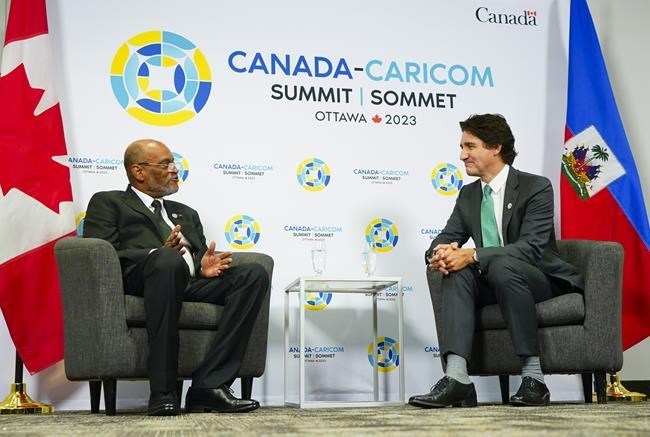OTTAWA — Prime Minister Justin Trudeau says he's been pushing the global community to target Haiti's political class before a gang crisis further destabilizes the Caribbean.
Leaders from the region, meanwhile, are pushing for more Canadian private investment.Â
"Right now, there's not even a consensus amongst the Haitian political class on whether or not someone should step in to stop people from being killed, murdered and raped," Trudeau told reporters Thursday.
He was speaking at the close of a two-day summit in Ottawa where leaders of the Caribbean Community gathered to touch base on Canadian co-operation with the region.
Trudeau invited the group, known as CARICOM, to Ottawa to touch base on everything from climate change to reforming global financial institutions.
Yet Haiti's security crisis loomed large over the summit, after a year of Canada calling for an end to brazen violence, sexual assaults and a hunger crisis in the country, where all elected officials have expired terms.
Kenya is preparing to lead a military intervention, which the United Nations Security Council approved this month, to stop gang violence. Canadian officials say the RCMP will likely send police, while the country is focused on helping Haiti maintain stability after the intervention ends.
Trinidad and Tobago Prime Minister Keith Rowley said CARICOM leaders are sensitive to concerns their support for Haiti will be conflated as propping up a "minority government arrangement."
He said it's crucial CARICOM and Canada be seen as "coming from honest brokers, and not in fact, propping up what exists in perpetuity — that in itself poses a danger."
The country has been governed by Haitian Prime Minister Ariel Henry since August 2021, when he assumed the role without having been elected, following the assassination of the country’s president.
On Wednesday, Trudeau's office publicly pressured Henry to work with his political opponents, releasing a statement touching on "the urgent need for a power-sharing agreement between Haitian Prime Minister Ariel Henry and opposition groups."
Trudeau would not say Thursday whether Henry has become a barrier to establishing security in Haiti, nor whether this week's meetings convinced him to work more with his opponents.
"It's been 30 years — 30 years, that Canada has been there to help the Haitian people," he said in French, in an impassioned tone.
"Unfortunately, during these 30 years, we weren't able to resolve the situation. And the reality is, it's not on the international community to resolve the situation for Haiti," Trudeau said.
He argued Haitians must be empowered to fix the problems themselves, which he said involves having more countries put "in the line of fire" corrupt elites who have allowed gangs to thrive. He added that Canada will always help Haiti.
Trudeau also announced Thursday that Canada is creating a new temporary worker program for the fisheries industry.Â
"Canada is committed to implementing a new foreign labour program for aquaculture and fish processing under our temporary foreign worker program," Trudeau said.
It was part of a focus Thursday on opportunities for Canadian investments in Caribbean countries, as well as boosting trade.
Trudeau said Canadian industries can partner with countries in the region for green infrastructure, "smart agriculture" and renewable energy.
Guyanese President Irfaan Ali said countries like his want corporate Canada to be "more aggressive" in investing in more industries than just mining and oil extraction.Â
"We want the Canadian private sector to come and be part of the opportunity, outside of the traditional areas of investment," he said Thursday.
Throughout the summit, Caribbean leaders frequently praised Canada's traditional role in relaying the region's concerns at other international forums.
Barbados Prime Minister Mia Mottley urged Trudeau on Wednesday to "help us speak truth to power" by convincing unnamed countries to stop preventing a reform of global financial institutions.
The leaders argued they are being economically devastated from large hurricanes, while not being able to afford infrastructure that could weather such storms because they are now too rich to qualify for loans meant for the world's poorest.
Many leaders praised Canada's leadership in development aid as Caribbean countries gained independence in the 1960s, and Ottawa's continued role in governing the Caribbean Development Bank.
Canada will host that bank's annual board meeting next year, and meetings are being planned between Canadian and Caribbean leaders in coming months.
This report by The Canadian Press was first published Oct. 19, 2023.
Dylan Robertson, The Canadian Press




